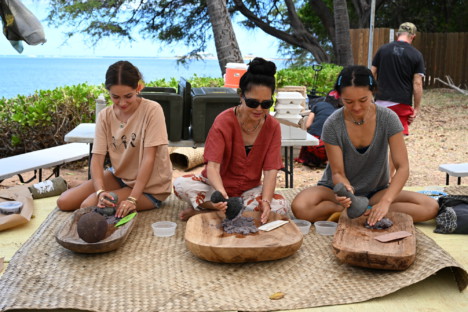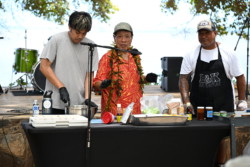La Hoʻihoʻi Ea 2025
By Léo Azambuja
More than 180 years ago, a rogue British captain burned Hawaiian flags and put the kindgom under siege for five-and-a-half months — without Britain’s approval. After hearing from Hawaii’s king, England sent officials to the islands, and Hawaiian sovereignty was restored.
La Hoʻihoʻi Ea, or the Sovereignity Restoration Day, was observed on Molokai with a day-long event featuring cultural workshops, live music and local foods at the Molokai Community Health Center last Saturday.
“This history was erased for a long time,” said Lauren Kikukawa, a member of the Hawaiian networking group Kanaeokana. “We need to start with educating the community of the history and what happened, and hope that we are moving towards the state of ea (sovereignty).”
Four large standing panels on display at the health center’s main hall told the chronology and history of La Hoʻihoʻi Ea. The same panels were in exhibit at Molokai Public Library the prior week. The panels, created a few years ago by Kanaeokana, travel throughout the Hawaiian Islands during the La Hoʻihoʻi Ea celebrations.
Event organizer Mercy Ritte, of the nonprofit organization ‘Aina Momona, said part of the reason for the event is to promote food sovereignty in Hawaii, a state that imports 80% to 90% of its food supply.
The focus and the mission of ‘Aina Momona, Ritte said, is to restore ‘aina, to promote food sovereignty, as well as prioritizing protection of native rights and natural resources. As such, the event highlighted the importance of local farmers and locally produced food.
“We have to be able to subsist and decrease our dependence on imported food, because we’re this tiny island right in the middle of the ocean,” Ritte said. “So, in the event, we talk about the history, but we also focus on food.”
Starting at 9 a.m., the event was attended by a few Native Hawaiian organizations and the Molokai Public Library doing outreach, and many vendors selling food prepared with locally sourced ingredients.
There were deer meat plate lunches, deer taegu, ahi poke bowls, luau stew, sashimi platters, fried ahi belly plates, Hawaiian trail mixes, desserts, fruit sherbet and many other treats. A cultural kalo workshop took place, and people could experience kalo that had been just pounded.
Live music was jamming on the beachfront stage until almost 1 p.m., when renowned chef Sam Choy did a spirited cooking demonstration.
“An event like this is very rare. All the other islands wish, but Molokai, you guys bring it. You guys look at the future of Molokai, and that’s for the keiki,” Choy told the crowd.
Choy prepared two kinds of fish poke; one more traditional, and the other similar to ceviche. He also did a deer meat poke, prepared with game harvested on Molokai. His last dish was a healthy salad mix of locally produced crops.
It was an honor, Choy said, to be on Molokai to participate in the event.
“My mom is a Meyer, so there is some kind of tie to this island,” Choy said.
His mother passed away of ovarian cancer a while ago, and lately he has been doing a lot of charity work, including raising $122 million for cancer research in Cleveland in the last decade.
“The other interesting thing is, I love the young generation, because I think that’s our future,” Choy said. “So, I want to share some of the things that I’ve learned growing up. Because I didn’t go to culinary school, I learned everything from my mom and dad’s kitchen.”
In mid-February, 1843, British citizen Richard Charlton claimed ownership of Honolulu. Lord George Paulet, captain of the British warship HMS Carysfort, demanded Charlton’s and his own demands be met. He lowered and burned the Hawaiian flag, and raised the British flag.
King Kauikeaouli, also known as King Kamehameha III, stepped aside but sent a message to England. As a result, British Admiral Richard Thomas was sent to Hawaii. On July 31, 1843, he ended Paulet’s short-lived reign of Hawaii.
On that day, Kauikeaouli said the famous words that would later become the motto of the state of Hawaii; “Ua mau ke ea o ka ‘aina i ka pono.” Generally translated to “The life of the land is perpetuated in righteousness,” Ritte said Kauikeaouli’s words were rather about the sovereignty of Hawaii’s land.
La Hoʻihoʻi Ea was celebrated until 1893, when the Hawaiian Kingdom was overthrown. Ritte said it wasn’t until 1986 that La Hoʻihoʻi Ea started being celebrated again in Hawaii.













Don't have a Molokai Dispatch ID?
Sign up is easy. Sign up now
You must login to post a comment.
Lost Password